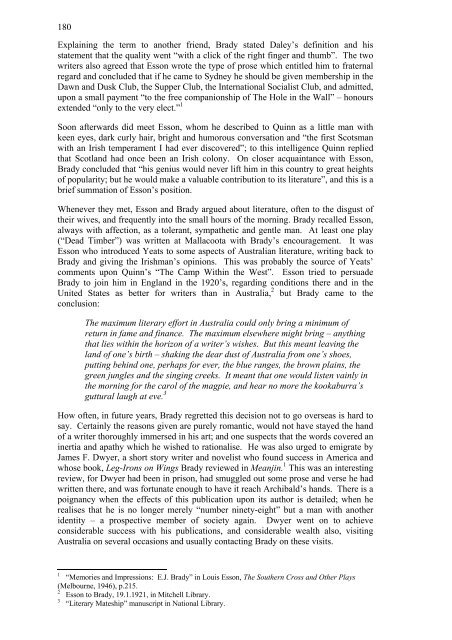A CRITICAL BIOGRAPHY OF EDWIN JAMES BRADY - Mallacoota ...
A CRITICAL BIOGRAPHY OF EDWIN JAMES BRADY - Mallacoota ...
A CRITICAL BIOGRAPHY OF EDWIN JAMES BRADY - Mallacoota ...
Create successful ePaper yourself
Turn your PDF publications into a flip-book with our unique Google optimized e-Paper software.
180<br />
Explaining the term to another friend, Brady stated Daley’s definition and his<br />
statement that the quality went “with a click of the right finger and thumb”. The two<br />
writers also agreed that Esson wrote the type of prose which entitled him to fraternal<br />
regard and concluded that if he came to Sydney he should be given membership in the<br />
Dawn and Dusk Club, the Supper Club, the International Socialist Club, and admitted,<br />
upon a small payment “to the free companionship of The Hole in the Wall” – honours<br />
extended “only to the very elect.” 1<br />
Soon afterwards did meet Esson, whom he described to Quinn as a little man with<br />
keen eyes, dark curly hair, bright and humorous conversation and “the first Scotsman<br />
with an Irish temperament I had ever discovered”; to this intelligence Quinn replied<br />
that Scotland had once been an Irish colony. On closer acquaintance with Esson,<br />
Brady concluded that “his genius would never lift him in this country to great heights<br />
of popularity; but he would make a valuable contribution to its literature”, and this is a<br />
brief summation of Esson’s position.<br />
Whenever they met, Esson and Brady argued about literature, often to the disgust of<br />
their wives, and frequently into the small hours of the morning. Brady recalled Esson,<br />
always with affection, as a tolerant, sympathetic and gentle man. At least one play<br />
(“Dead Timber”) was written at <strong>Mallacoota</strong> with Brady’s encouragement. It was<br />
Esson who introduced Yeats to some aspects of Australian literature, writing back to<br />
Brady and giving the Irishman’s opinions. This was probably the source of Yeats’<br />
comments upon Quinn’s “The Camp Within the West”. Esson tried to persuade<br />
Brady to join him in England in the 1920’s, regarding conditions there and in the<br />
United States as better for writers than in Australia, 2 but Brady came to the<br />
conclusion:<br />
The maximum literary effort in Australia could only bring a minimum of<br />
return in fame and finance. The maximum elsewhere might bring – anything<br />
that lies within the horizon of a writer’s wishes. But this meant leaving the<br />
land of one’s birth – shaking the dear dust of Australia from one’s shoes,<br />
putting behind one, perhaps for ever, the blue ranges, the brown plains, the<br />
green jungles and the singing creeks. It meant that one would listen vainly in<br />
the morning for the carol of the magpie, and hear no more the kookaburra’s<br />
guttural laugh at eve. 3<br />
How often, in future years, Brady regretted this decision not to go overseas is hard to<br />
say. Certainly the reasons given are purely romantic, would not have stayed the hand<br />
of a writer thoroughly immersed in his art; and one suspects that the words covered an<br />
inertia and apathy which he wished to rationalise. He was also urged to emigrate by<br />
James F. Dwyer, a short story writer and novelist who found success in America and<br />
whose book, Leg-Irons on Wings Brady reviewed in Meanjin. 1 This was an interesting<br />
review, for Dwyer had been in prison, had smuggled out some prose and verse he had<br />
written there, and was fortunate enough to have it reach Archibald’s hands. There is a<br />
poignancy when the effects of this publication upon its author is detailed; when he<br />
realises that he is no longer merely “number ninety-eight” but a man with another<br />
identity – a prospective member of society again. Dwyer went on to achieve<br />
considerable success with his publications, and considerable wealth also, visiting<br />
Australia on several occasions and usually contacting Brady on these visits.<br />
1<br />
“Memories and Impressions: E.J. Brady” in Louis Esson, The Southern Cross and Other Plays<br />
(Melbourne, 1946), p.215.<br />
2<br />
Esson to Brady, 19.1.1921, in Mitchell Library.<br />
3<br />
“Literary Mateship” manuscript in National Library.


